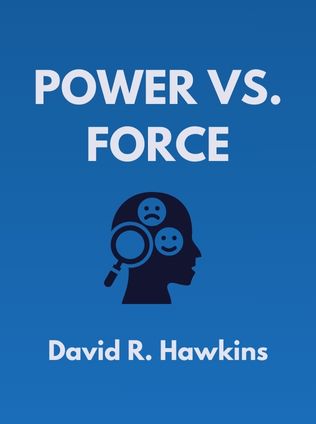
Power vs. Force
The Hidden Determinants of Human Behavior (Paperback)
By David R. Hawkins
Published 06/1985
About the Author
David R. Hawkins (1927-2012) was a distinguished psychiatrist, author, and spiritual teacher whose groundbreaking work has left a lasting impact on the fields of psychology and spiritual growth. Hawkins’s career began in the realm of medicine, where he specialized in treating schizophrenia and addiction. His expertise in psychiatry was marked by a compassionate approach, seeking not just to alleviate symptoms but to understand the deeper issues affecting his patients.
In addition to his clinical work, Hawkins was an acclaimed author, with his most famous book being *Power vs. Force*. His writings bridge the gap between science and spirituality, reflecting his belief in a unified theory of consciousness that integrates both aspects of human experience. Hawkins founded several organizations dedicated to psychiatric research and spiritual development, further extending his influence beyond his clinical practice.
Hawkins’s work was influenced by his own spiritual experiences and his extensive study of consciousness. He developed a unique framework for understanding human consciousness, which he shared through his books, lectures, and seminars. His approach combines elements of psychology, philosophy, and spirituality, offering a holistic view of human potential and growth.
Main Idea
*Power vs. Force* explores the concept of human consciousness and how it can be understood and measured. Hawkins introduces the idea that consciousness exists on a scale, ranging from lower states characterized by negativity and destruction to higher states marked by positivity and enlightenment. According to Hawkins, the level of consciousness determines an individual’s experiences, behaviors, and interactions with others.
At the core of Hawkins's message is the notion that elevating one's consciousness can lead to profound personal and societal transformation. He argues that higher levels of consciousness are associated with greater understanding, compassion, and effectiveness in life. Through this lens, Hawkins provides a framework for measuring and enhancing consciousness, which he believes is essential for achieving personal fulfillment and making a positive impact on the world.
Table of Contents
- Introduction to Consciousness
- The Universal Consciousness
- Measuring Consciousness
- The Consciousness Scale
- Coercion vs. Power
- Energy and Coercion in Behavioral Science
- Path to Enlightenment
- The Virtuous Cycle of Consciousness
Introduction to Consciousness
Hawkins begins by defining consciousness as the ability to perceive, understand, and interact with both internal and external realities. He suggests that consciousness is not a static trait but a dynamic aspect of human experience that can be developed and expanded over time. This view aligns with the philosophical perspective of consciousness as an evolving state rather than a fixed entity.
One of Hawkins’s key contributions is his assertion that consciousness can be measured through its energetic frequency. He likens consciousness to a spectrum, where different levels correspond to various states of awareness and behavior. This measurement approach is innovative and controversial, as it seeks to quantify an abstract concept in a way that can be empirically studied.
Hawkins’s approach contrasts with traditional views of consciousness, which often focus on the neurological or psychological aspects. Instead, Hawkins emphasizes the energetic dimension, suggesting that higher consciousness correlates with positive energy and greater alignment with universal truths. This perspective has been both praised and criticized, as it challenges conventional scientific paradigms and introduces a new way of understanding human experience.
Sign up for FREE and get access to 1,400+ books summaries.
You May Also Like
The Subtle Art of Not Giving a F*ck
A Counterintuitive Approach to Living a Good Life
By Mark MansonRich Dad Poor Dad
What the Rich Teach Their Kids About Money - That the Poor and Middle Class Do Not!
By Robert T. KiyosakiHow To Win Friends and Influence People
The All-Time Classic Manual Of People Skills
By Dale CarnegieFreakonomics
A Rogue Economist Explores the Hidden Side of Everything
By Steven D. Levitt and Stephen J. Dubner



















